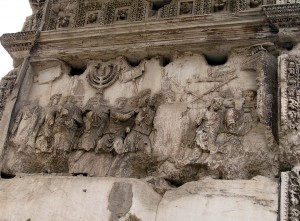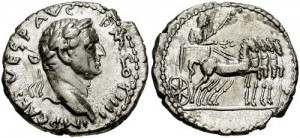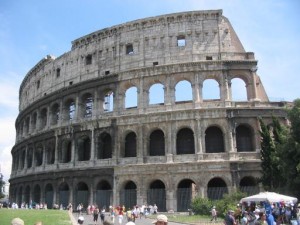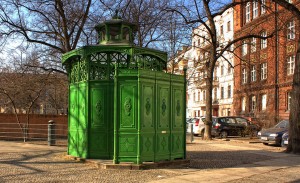“Money doesn’t stink” – Gold is (at least for humans) odorless, so goes the platitude. But how exactly did this saying come about?
This saying was coined by Roman Emperor Vespasian. He came to power as the last ruler in the four-emperor-year of 69 AD and stabilized Rome after an extended phase of mismanagement by changing rulers. Vespasian adjusted the state’s finances, consolidated the empire and was characterized by his well-grounded attitude, sense of duty and humor – and he had no inhibitions to even use “disreputable” sources to stabilize the Rome’s finances.
His talent for finances may result from his lineage, because Titus Flavius Vespasian was the son of a tax collector. The family did not hail from Rome, but from Latium province north of the capital. It was not part of the Roman upper class of senators, but belonged to the Eques, the lower nobility, instead.
At the time of the republic, rich middle class Romans, who could afford horses, formed the class of the Eques, the “horse-riders”. Originally they fought as cavalry in wars, but during the reign of emperors this duty was relinquished. The families however retained their political privileges and had access to public offices and a career in the state’s administration.
But his family had ambitions; one uncle had already become senator and Vespasian’s older brother worked in the Roman administration. So Titus Flavius Vespasianus also pursued a career in that field on his “cursus honorum”. Since about the 5th century BC, this career path was the approved way to the highest state offices, the magistrate, and since about 180 BC, the cursus was even compulsory.
He served with considerable success in his positions within the army and the public administration of the provinces, whereas, in contrast to the customs of many of his colleagues, he did not overly enrich himself. Since all public posts in Rome were honorary posts, ambitious aristocrats needed to have solid financial means to be able to afford the path to power and influence.
Under Emperor Claudius, Vespasianus served in the military in Germania and took part in the conquest of Britain. After letting him wait for some time, in 62 AD Nero made him proconsul of the province of Africa and sent him into battle against the insurgent population of the Judea province as a commander. For Nero he was a loyal, experienced military follower, who was not yet a compromised favorite. This was an important aspect, since the legions already began to object to Nero’s way of rule.
Vespasianus commanded three legions in Judea, 60,000 men in total, and he waged war for years, without sparing the civilian population. Following Nero’s suicide in 68 AD, Vespasianus treaded carefully. He sent his son Titus to Rome to the successor Galba, to have his command confirmed. By doing this, he indirectly acknowledged Galba as the new emperor.
He also remained in the background after the assassination of Galba, although he didn’t accept either Otho or Vitellius, the candidates to become the next ruler. Instead he rallied his supporters, among them Gaius Licinius Mucianus, the governor of Syria. When the governor of the Egyptian province also joined the ranks of his supporters, at the beginning of July 69 AD, he was proclaimed emperor by his legions and those of his allies. Even some client kings accepted his claim to power and so he commanded the full power of all the southern legions and substantial financial means from tribute payments.
While Mucianus ferried over to Italy with a legion to take over Rome, Vespasianus himself traveled to Egypt, in order to take control of the grain supplies to the capital. Another insurgent legion that joined Vespasianus marched to Rome from the Danube river. Following a failed attempt to bribe the opponent Vitellius into giving up, Mucianus and his men conquered Rome in December 69 in bloody battles, in which Vitellius was brutally tortured and thrown into the Tiber river. Vespasianus was proclaimed princeps, but he only returned to the capital in the summer of 70 AD.
Coin with Vespasian’s portrait
With sure instincts he reformed the army, reduced the number of legions and ensured a better mix in the different sections, so that no tribe would gain dominance in a legion. He pursued the conquest of Britain and under the leadership of his son Titus, the Roman legions ended the uprising in Judea.
Domestically, he forced a return to the rule of law, which his predecessors had often ignored. His propaganda was smart and he labeled himself the preserver of the republican tradition, in stark contrast to the decadence of his predecessors. With new magnificent buildings and water supply lines, he increased his glory and the famous Colosseum in Rome was built on his order.
But his most important task was to reorganize the financial affairs of the empire, because his predecessors, mainly Nero, focused mainly on spending money. He invented countless new taxes, and more importantly he tried to close tax loop holes. For example he abolished the tax exemption in Greek-speaking regions and in Egypt.
His elaborate tax policy covered many aspects of life, for example he sold public offices and Roman civil rights and even charged a fee for using public latrines. When his son Titus criticized him because of that, Vespasianus allegedly held the money from the first payment under his nose and asked him, whether he objected to the smell. His son then had to admit that “(pecunia) non olet”, the money “didn’t stink”. This developed into a well-known saying and for some time, the French expression “Vespasiennes” as name for public latrines was widely used.
Vespasianus also showed his down-to-earth humor in a different way. As soon as he noted the first signs of a severe illness, that would ultimately cost him his life, he allegedly started making fun of the deification craze of the Romans (deification = glorifying a dead person as a god) by saying: “Oh dear, I think I’m becoming a god!”
Image sources:
https://commons.wikimedia.org/wiki/File:Neues_Museum_-_Kolossalbildnis_des_r%C3%B6mischen_Kaisers_Vespasian.jpg#/media/File:Neues_Museum_-_Kolossalbildnis_des_r%C3%B6mischen_Kaisers_Vespasian.jpg
https://commons.wikimedia.org/wiki/File:Rom,_Titusbogen,_Triumphzug.jpg#/media/File:Rom,_Titusbogen,_Triumphzug.jpg
http://www.cngcoins.com. Lizenziert unter CC BY-SA 2.5 über Wikimedia Commons
https://commons.wikimedia.org/wiki/File:VESPASIANUS_-_RIC_II_364_-_151255.jpg#/media/File:VESPASIANUS_-_RIC_II_364_-_151255.jpg
https://commons.wikimedia.org/wiki/File:Colosseum-2003-07-09.jpg#/media/File:Colosseum-2003-07-09.jpg
https://commons.wikimedia.org/wiki/File:Berlin_Germany.jpg#/media/File:Berlin_Germany.jpg






Money doesn’t stink, but the cauldron does.